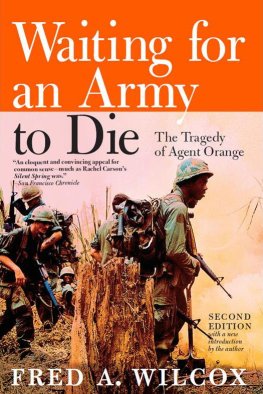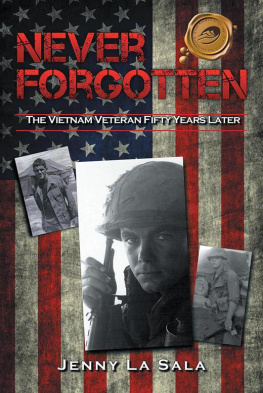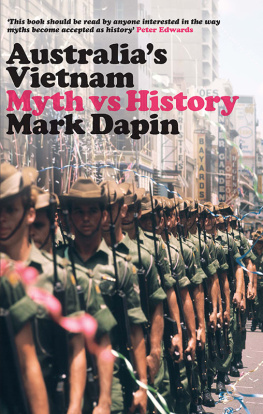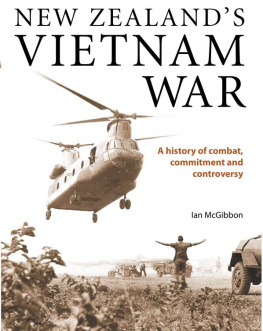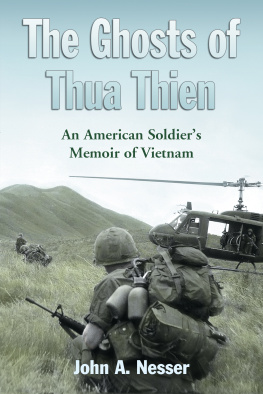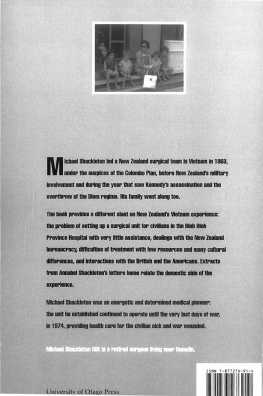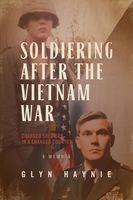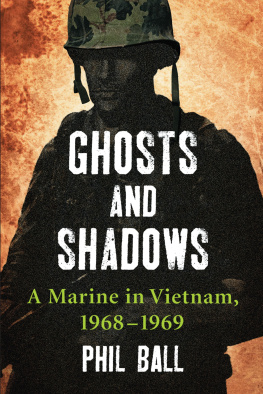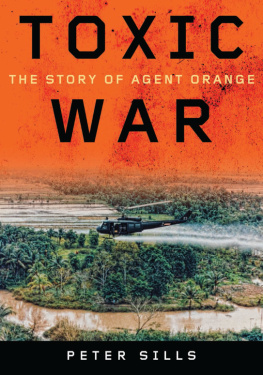Every effort has been made to ensure that all material is free from error. However, no responsibility can be taken for factual inaccuracies contained within the veterans own testimonies. The author and publisher have also made every effort to contact copyright holders of images; any omissions will be rectified on reprints or new editions upon notification to the publisher.
When I began looking into what has happened for New Zealands Vietnam veteran community over the past 10 years in preparation for writing the new, updating chapter, to my shock I discovered that 13 of the 50 veterans I had originally interviewed in 1995 and 1996 have died. Thats 25 per cent.
This updated edition of Grey Ghosts is therefore dedicated to:
Allan Grayling
Dave Douglas
John Hall
Peter Earsman
Des Sluce
and the eight men who chose to, and will remain, anonymous. It is also dedicated to the late Rod Eder, veteran and author of Deep Jay.
The new chapter is a mere overview of the events of the past 10 years; in the course of my research I gathered a lot of material, most of which doesnt appear here. The subject is a book in itself, which may sound like a clich but in this case it happens to be true. The material has all been invaluable, if rather complex, and I hope Ive included the salient points and given fair representation to the varying perspectives. Any errors are mine, not those of the contributors.
I thank everyone who has been so generous with their time and information. These veterans are John Masters and Bruce Issy Isbister (interviewed in Christchurch on 7 October 2008), Chris Mullane and Rod Baldwin (interviewed in Auckland on 21 October 2008), John Moller (consulted by email between 17 September and 30 October 2008), and John Campbell (consulted by email on 30 October 2008).
Thanks also to HarperCollinsPublishers New Zealand for publishing this updated edition of Grey Ghosts, and for doing a sterling job of editing, producing, selling and publicizing it.
A quick note: the figure 3,890 quoted in the original edition of this book in relation to the number of New Zealand personnel who served in Vietnam is misleading. New Zealand personnel did 3,890 tours of duty in Vietnamthe actual number of people who went is 3,368.
Deborah Challinor
November 2008
This book is an adapted version of my PhD thesis. I became interested in the Vietnam War when I was first studying at university, and I saw an Australian documentary called Hearts and Minds, which included scenes of Vietnamese women and children crying over the bodies of dead husbands and fathers. I started wondering about what effect the war had had on the soldiers who had been sent there to fight it.
I went to the library and found quite a lot of books about US involvement, but when I looked in the New Zealand section all I could find were a couple of anti-war pamphlets and two or three official government reports about New Zealand aid to Vietnam and the military contribution we had made. That was it, and I started to wonder why.
I started collecting whatever I could find about the war, mostly American and Australian material, because there was virtually nothing published about New Zealanders in Vietnam until the late 1980s. In the past few years, more books have been published, mainly by veterans, but not enough, in my view, to give a good idea of what New Zealanders did in Vietnam, what happened to them when they came home, and what they think about the war.
In 1995, I started working on the Vietnam Project. Rather than trying to write something based on second-hand views of what happened, I decided to talk to some of the New Zealanders who actually went to Vietnam. First, I contacted the Hamilton V-Force Veterans and told them what I was doing, and they invited me to come to one of their meetings.
I ended up interviewing most of the veterans in the group, and from there the ball kept rolling. I was able to arrange more interviews through word of mouth; and I also put an advertisement in Contact, the New Zealand magazine for Vietnam veterans produced by the Ex-Vietnam Services Association. By 1997, I had interviewed 48 New Zealand veterans from all over the country, and two who live in Australia.
Thirty-nine of the interviews were tape-recorded face to face, and the remaining 11 were obtained by correspondence. In most cases I sent the interview questions in advance, so everybody knew roughly what I was going to ask them, together with an outline of the study and a release-of-information form. The veterans were able to choose whether they used their own names, an alias, or no name at all. More than half used their own names, and I have respected the anonymity requested by the others. Where aliases have been usedsuch as Matt G or TW Washburnquotation marks have been used.
I interviewed people who had held ranks in Vietnam from Private to Colonel, and infantrymen, gunners, military policemen, medics, a padre, a pilot, a member of one of the Army training teams, an SAS veteran, and six people who did more than one tour of duty of Vietnam. Length of time spent in the services ranged from three years to 30, with more than half of the interviewees having done 20 years. (See Appendix 1.)
The veterans were open and honest and enthusiastic about the project. Nobody seemed irritated at the questions I asked, or declined to answer, although quite a few had some moments when they struggled to control their emotions, which included sorrow, anger and hysterical laughter. Some had photo albums and other material for me to look at and in some cases borrow, and many actually thanked me for interviewing them.
Most had never been approached before about their Vietnam experiences, and a lot said they had never spoken about it before I interviewed themmainly because nobody had bothered to askand several said they were keen to have their experiences of what happened recorded before it was too late.
I transcribed all of the tape-recorded interviews word for word, which took months as there were nearly 100 hours of tape, and sent each veteran a copy of their own interview with a reminder that they were free to withdraw their contribution at any point, or make changes to it, for any reason. Only one person withdrew, and one or two others made minor changes to what they had originally said.
In the text, where I have used the words some, many or most in reference to the veterans, it has to be remembered that I am only referring to the ones I interviewed, not all 3,368 New Zealanders who served in Vietnam. It is quite possible that the many veterans I have not talked to had quite different experiences.
As well as interviewing 50 veterans for this project, I went to various libraries and resource centres for documents, photographs and other information. I went to the library at Defence Headquarters in Wellington, to the Alexander Turnbull Library at the National Library, also in Wellington, and I spent several days at the Kippenberger Military Archive and Library at the Queen Elizabeth II Army Memorial Museum at Waiouru. I also went to the Australian War Memorial in Canberra for six weeks during 1996 on a scholarship, which gave me a useful perspective on the Australian experience in Vietnam, some illuminating material relating to the New Zealanders in Vietnam (such as Colonel David Beards description of saving a New Zealand infantrymans life), and an opportunity to see how the Australians remember their Vietnam experience.
Following are short profiles of some of the veterans who were interviewed. Obviously, only the veterans who did not request anonymity are mentioned here.
Fred Barclay served in Vietnam for 13 months from November 1968 to December 1969 with 4Troop, New Zealand Special Air Service (SAS), which operated with the Australian SAS based at Nui Dat, the Australian and New Zealand military base in Phuoc Tuy Province. He was a Sergeant and 30 years old during his tour. Barclay had served in the Army for 10 years before he went to Vietnam, four years with the infantry during which he did a tour in Malaya, then six with the SAS. Barclays Army career lasted 28 years.


